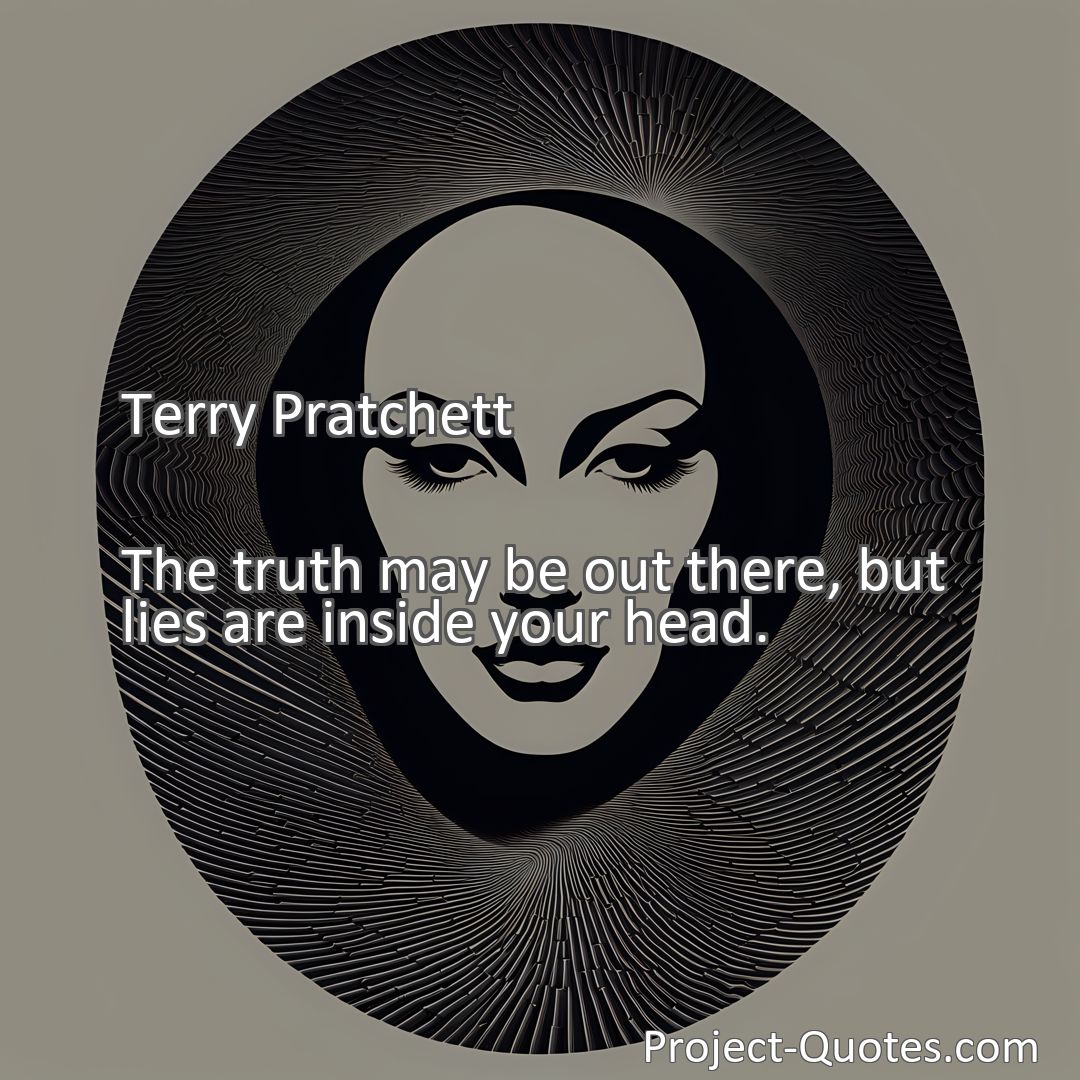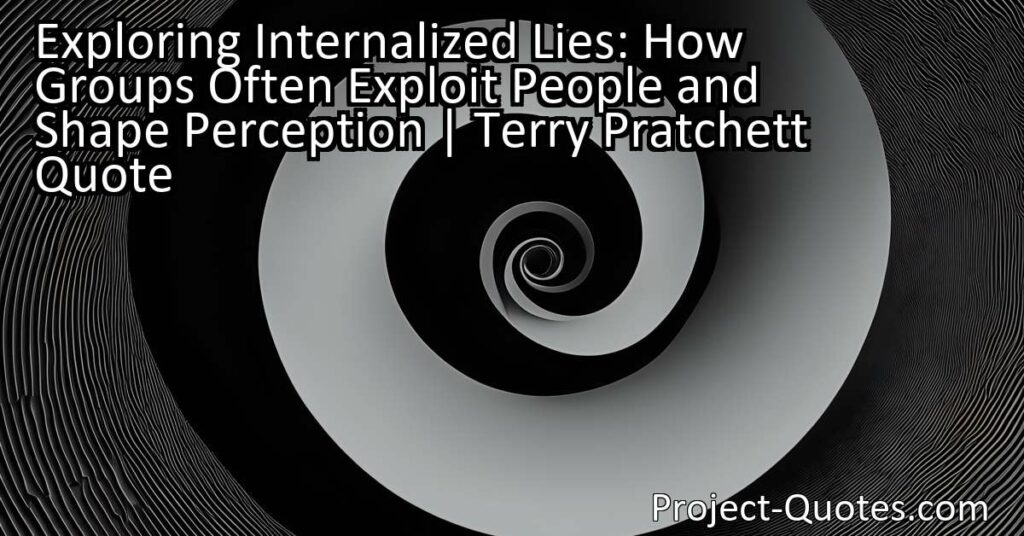The truth may be out there, but lies are inside your head.
Terry Pratchett
Exploring Internalized Lies: How Groups Often Exploit People and Shape Perception Terry Pratchett’s quote, “The truth may be out there, but lies are inside your head,” reveals the power of internalized lies in shaping our perception of reality. This includes the influence of manipulative groups and the media in spreading misinformation. By developing critical thinking skills and confronting internalized lies, individuals can strive for a more accurate understanding of the truth and foster an enlightened society.
Table of Contents
Meaning of Quote – The truth may be out there, but lies are inside your head.
The famous author Terry Pratchett once said, “The truth may be out there, but lies are inside your head.” These insightful words hold a powerful message that resonates with people of all ages and backgrounds. In a world filled with constant information and diverse opinions, it is crucial to confront the reality that truth and lies coexist in our minds and shape our perception of the world.
At first glance, Pratchett’s quote might seem perplexing. We often associate lies with deceit and dishonesty, while the truth is valued as a fundamental virtue. However, Pratchett challenges this notion by pointing out that lies originate within our own minds. This suggests that the lies we tell ourselves can be just as influential as the ones we hear from others. In other words, our perception of the truth is profoundly influenced by our own internal biases, beliefs, and personal experiences.
Understanding the concept of internalized lies requires an exploration of the human mind and the way it processes information. Our brains are complex and sophisticated, continually filtering and interpreting the vast array of stimuli we encounter daily. This filtering process is influenced by various factors such as our emotions, past experiences, and cultural backgrounds. Consequently, our minds have the incredible ability to create narratives and beliefs that might not necessarily align with objective reality.
The power of internalized lies becomes even more apparent when considering the role of media and information sources in shaping our perception of truth. In today’s digital age, where news spreads at an unprecedented speed, it is easy to become overwhelmed by conflicting information. We are exposed to a barrage of news articles, social media posts, and opinion pieces, each presenting its version of the truth. With such an abundance of information, it becomes challenging to discern fact from fiction.
Moreover, the rise of fake news and misinformation further muddles our understanding of the truth. Manipulative individuals or groups often exploit people’s cognitive biases and gaps in knowledge to spread misleading or entirely false information. This distortion of truth can have profound consequences, influencing public opinion and shaping societal discourse. Thus, it is critical for individuals to develop critical thinking skills that allow them to navigate through the landscape of misinformation and identify reliable sources of information.
However, even when we actively seek objective and accurate information, we cannot ignore the role of internalized lies in shaping our perception of reality. These lies can manifest as preconceived notions, biases, or deeply ingrained beliefs, often stemming from our upbringing or previous experiences. For instance, if someone grew up in an environment where they were repeatedly told they were unworthy, they might internalize these lies and struggle with low self-esteem, regardless of the external evidence that disproves it.
Internalized lies can also manifest in more subtle ways, such as confirmation bias. This cognitive bias leads individuals to seek out information that confirms their existing beliefs and dismiss or ignore information that contradicts them. As a result, even when exposed to accurate and factual information, people may unconsciously choose to believe in the lies they have internalized, perpetuating a cycle of misinformation and reinforcing skewed perceptions of reality.
Confronting and dismantling internalized lies can be a challenging and introspective process. It requires individuals to question their own beliefs, challenge long-held assumptions, and engage in critical self-reflection. This process is valuable not only for personal growth but also for fostering a more informed and empathetic society. By acknowledging the presence of internalized lies, individuals can cultivate a mindset that is open to new perspectives, willing to challenge preconceived notions, and committed to seeking out the truth.
Education plays a vital role in enabling individuals to confront internalized lies and develop critical thinking skills. By teaching students how to critically analyze information, evaluate sources, and challenge their own biases, educators can empower the next generation to navigate the complexities of the modern world. Encouraging intellectual curiosity, promoting healthy skepticism, and fostering a culture of intellectual humility are essential to developing informed and discerning individuals.
Furthermore, it is crucial for everyone to understand that acknowledging the presence of internalized lies does not undermine the existence or importance of objective truth. While our perception of truth might be shaped by our individual experiences and biases, objective truth exists independent of our personal beliefs. Society should still strive to cultivate an environment where truth is valued, facts are rigorously examined, and honesty is paramount.
In conclusion, Terry Pratchett’s quote, “The truth may be out there, but lies are inside your head,” serves as a powerful reminder of the complex nature of truth. The internalized lies that shape our perception of reality, combined with the proliferation of misinformation in the media, highlight the importance of critical thinking, self-reflection, and an openness to hearing diverse perspectives. Ultimately, by confronting and dismantling internalized lies, individuals can strive towards a more accurate and informed understanding of the truth, fostering both personal growth and a more enlightened society.
I hope this quote inspired image brings you hope and peace. Share it with someone who needs it today!


